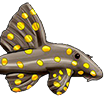Sturisomatichthys leightoni have a short rostrum and a more compact body, dont reach the same lenght that S. aureum.
Sturisomatichthys leightoni from the Cat-eLog.

S. aureum have a long rostrum, the longest in this group ( S.aureum, festivum and panamense) from this area and special in females.
This pic
http://www.planetcatfish.com/forum/albu ... pic_id=680 shows what I believe is S. aureum and S. festivum
Under the different stage of age and size S. aureum and S. leightoni can look similar, I have breed both S. aureum and S. festivum since the 80's and it has always been discussed which is which and if S. aureum realy are that one that have been in the trade.
Shane,
I maybe is wrong and I know you have done a lot of research and have seen 1000's of this species when you lived in Colombia and I have no doubts about that...I whish I could do the same. For me your three pics shows the same species but at different age and size, a youngster first, second a subadult and last pic a small adult male...all S. aureum.
S. aureum origin from Rio Magdalena and should be videly distributed in that drainage, S. festivum origin from Rio Catatumbo (Colombia) and the Maracaibo basin (Venezuela) that river ends in Maracaibo basin so they are conected.
S. panamense have I never seen in the trade under all the years I have kept fishes and I started for over 35 years ago, but what I have understand is that S. panamense even should live in Colombia near the border to Panama except in Panama of course.
The parents of S. aureum in my pic was cought in Rio Magdalena, S. festivum I have not succed to confirm their origin more then they was exported for many years ago from Colombia and I have not seen them in the trade since that.
Janne











